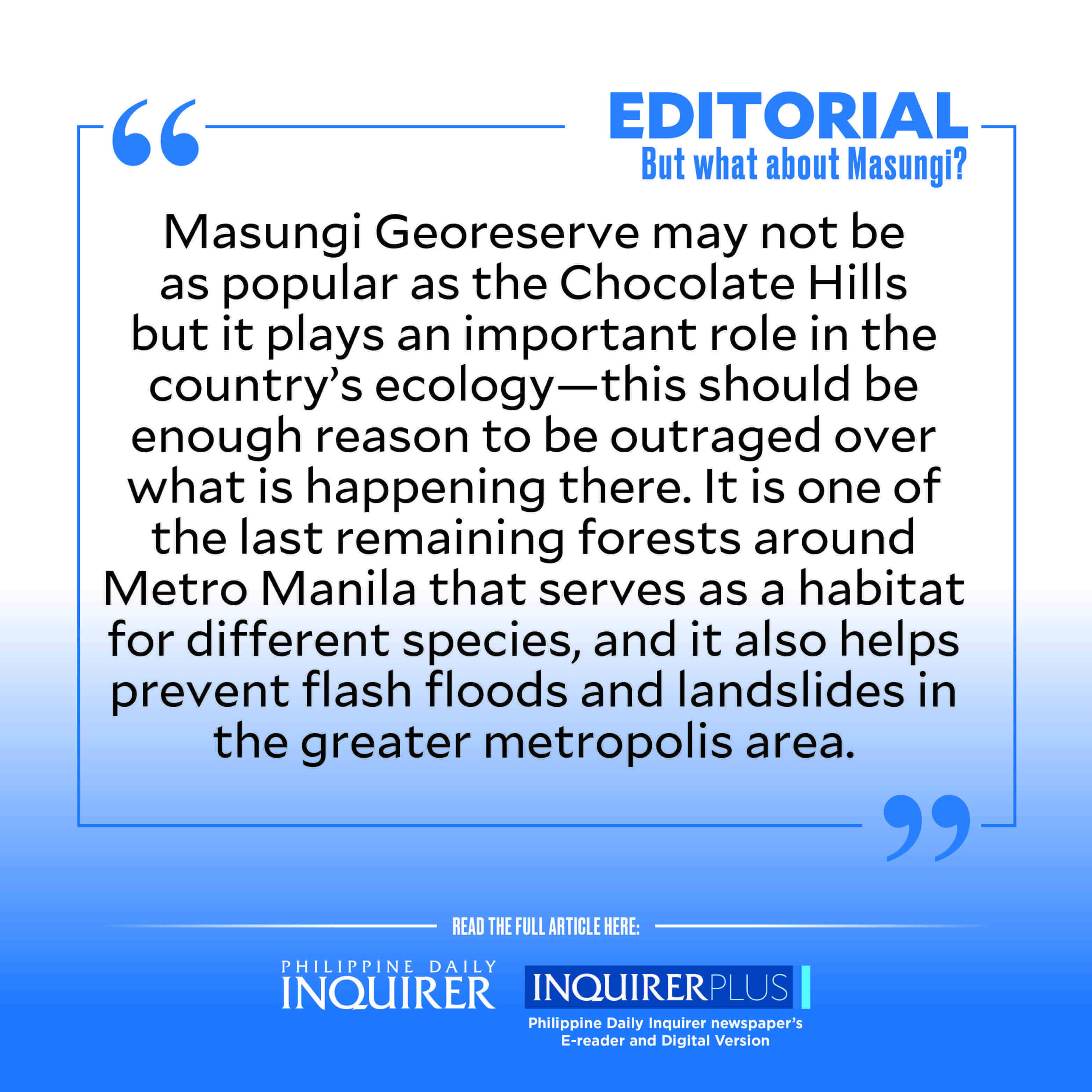But what about Masungi?

The recent uproar over a massive swimming pool at the foot of the Chocolate Hills has led to the temporary closure of the resort operating it due to violation of environmental laws. But just 45 kilometers from Metro Manila, similar incidents have ironically not sparked as much outrage or prompted any decisive action from the Department of Environment and Natural Resources (DENR).A drone shot posted on the Meta (Facebook) page of Masungi Georeserve on March 17 showed several swimming pool resorts inside the Upper Marikina River Basin, where the georeserve management operates. “For years, we have tried to raise awareness about this issue, with our rangers constantly put at risk for trying to prevent encroachments with little to no support,” it stated in the post.
Masungi Georeserve Foundation Inc. (MGFI), an entity tasked to lead the georeserve’s conservation through a memorandum of agreement (MOA) signed with the government in 2017, has been in the thick of issues that in the past have escalated into violent attacks against its personnel.
‘Perpetual trust’
The Department of Justice, which planned to build a penitentiary in the protected area, has questioned the MOA, citing the “perpetual trust” conferred to MGFI during the term of the late Gina Lopez as a constitutional violation. The MGFI, in a position paper submitted to the House of Representatives last year, countered that the MOA “should be read in its entirety” and not reduced to the single phrase “perpetual land trust,” and that the same should not be considered as a perpetual license but as a “perpetual land trust for conservation.”
Environmental advocates campaigning for support for Masungi have warned that destroying the protected area could lead to devastating effects not only in the immediate communities surrounding it but also in Greater Metro Manila. Canceling the contract with MGFI, they warned, could open the floodgates—figuratively and literally—for business development that could ruin the area’s ecology.
Ecological disasters
“If the [MOA would] be canceled, then you remove that first and last line of defense that you have for the watershed area. Removing Masungi will cascade into various ecological disasters and also the wholesale entry of the different resource-grabbing companies, the speeding up of the degradation of the watershed, and consequently, the speeding up of the risks of floods and other natural disasters amplified by climate change,” said Leon Dulce, national coordinator of the Kalikasan People’s Network for the Environment, in the CNA documentary, “The Last Defenders of the Philippines,” released in September 2022.
The Masungi Georeserve, which is said to have a lot of mineral resources for industrial use beneath the watershed areas, continues to face many challenges. Last year, the Bureau of Corrections revealed plans to relocate the New Bilibid Prisons and its headquarters to Masungi.
Fragile ecology
Also last year, a Singapore-based wind power company was found to be drilling inside the Masungi Karst Conservation Area ahead of plans to erect 12 wind turbines that could be fatal to the 100 species of birds and 30 species of bats in the area. House Deputy Minority Leader France Castro has urged the government to revoke all permits, including that of the wind power project, approved for Masungi Georeserve as these would “wreak havoc on our fragile ecology” and cause “dangerous floods.”Following the controversy over the Chocolate Hills resort this month, MGFI revived its call to bring attention to the construction of resorts—at least seven—within the georeserve. It warned that these resorts could impact the natural water flow, reduce the soil’s capacity to store water, and lead to worse flooding or landslides in the downstream areas.
Deadliest country
The previous administration had ordered a probe into these resort facilities first exposed in 2021. Back then, MGFI already lamented DENR’s lack of proactive action despite violent attacks resulting in the injury of two forest rangers. That same year, the Philippines ranked as the deadliest country for land and environmental defenders in Asia; last year, it ranked fifth in the world.
That the DENR has allowed the violence to continue and escalate—instead of resolving the issues at the core of MGFI and the georeserve, as well as going after those who quarry, occupy lands, and violate environmental laws—only heightens imputations that business and political interests take precedence over environment preservation.
Masungi Georeserve may not be as popular as the Chocolate Hills but it plays an important role in the country’s ecology—this should be enough reason to be outraged over what is happening there. It is one of the last remaining forests around Metro Manila that serves as a habitat for different species, and it also helps prevent flash floods and landslides in the greater metropolis area. Considering that the Philippines is one of the most vulnerable countries to climate change, the government must encourage and support efforts to preserve and conserve our natural resources—instead of enabling harm to the environment and those who protect it.
















